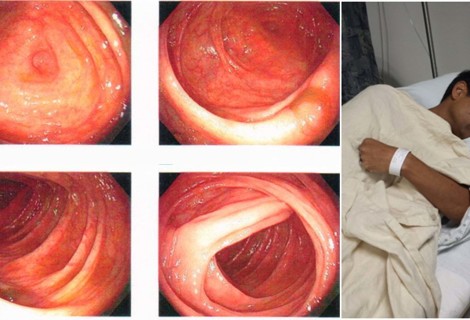Colon Polyps
What are colon polyps?
A polyp is extra tissue that grows inside your body. Colon polyps grow in the large intestine. The large intestine, also called the colon, is part of your digestive system. It’s a long, hollow tube at the end of your digestive tract where your body makes and stores stool.
Are polyps dangerous?
Most polyps are not dangerous. Most are benign, which means they are not cancer. But over time, some types of polyps can turn into cancer. Usually, polyps that are smaller than a pea aren’t harmful. But larger polyps could someday become cancer or may already be cancer. To be safe, doctors remove all polyps and test them.
Who gets polyps?
Anyone can get polyps, but certain people are more likely than others. You may have a greater chance of getting polyps if
- you’re over 50. The older you get, the more likely you are to develop polyps.
- you’ve had polyps before.
- someone in your family has had polyps.
- someone in your family has had cancer of the large intestine.
You may also be more likely to get polyps if you
- eat a lot of fatty foods
- smoke
- drink alcohol
- don’t exercise
- weigh too much
What are the symptoms?
Most small polyps don’t cause symptoms. Often, people don’t know they have one until the doctor finds it during a regular checkup or while testing them for something else.
But some people do have symptoms like these:
- bleeding from the anus. You might notice blood on your underwear or on toilet paper after you’ve had a bowel movement.
- constipation or diarrhea that lasts more than a week.
- blood in the stool. Blood can make stool look black, or it can show up as red streaks in the stool.
If you have any of these symptoms, see a doctor to find out what the problem is.
How does the doctor test for polyps?
The doctor can use four tests to check for polyps:
- Digital rectal exam. The doctor wears gloves and checks your rectum, the last part of the large intestine, to see if it feels normal. This test would find polyps only in the rectum, so the doctor may need to do one of the other tests listed below to find polyps higher up in the intestine.
- Barium enema. The doctor puts a liquid called barium into your rectum before taking x rays of your large intestine. Barium makes your intestine look white in the pictures. Polyps are dark, so they’re easy to see.
- Sigmoidoscopy. With this test, the doctor can see inside your large intestine. The doctor puts a thin flexible tube into your rectum. The device is called a sigmoidoscope, and it has a light and a tiny video camera in it. The doctor uses the sigmoidoscope to look at the last third of your large intestine.
- Colonoscopy. This test is like sigmoidoscopy, but the doctor looks at all of the large intestine. It usually requires sedation.
Who should get tested for polyps?
Talk to your doctor about getting tested for polyps if
- you have symptoms
- you’re 50 years old or older
- someone in your family has had polyps or colon cancer
How are polyps treated?
The doctor will remove the polyp. Sometimes, the doctor takes it out during sigmoidoscopy or colonoscopy. Or the doctor may decide to operate through the abdomen. The polyp is then tested for cancer.
If you’ve had polyps, the doctor may want you to get tested regularly in the future.
How can I prevent polyps?
Doctors don’t know of any one sure way to prevent polyps. But you might be able to lower your risk of getting them if you
- eat more fruits and vegetables and less fatty food
- don’t smoke
- avoid alcohol
- exercise every day
- lose weight if you’re overweight
Eating more calcium and folate can also lower your risk of getting polyps. Some foods that are rich in calcium are milk, cheese, and broccoli. Some foods that are rich in folate are chickpeas, kidney beans, and spinach.
Some doctors think that aspirin might help prevent polyps. Studies are under way.
Points to Remember
- A polyp is extra tissue that grows inside the body. Most polyps are not harmful.
- Symptoms may include constipation or diarrhea for more than a week or blood on your underwear, on toilet paper, or in your stool.
- Many polyps do not cause symptoms.
- Doctors remove all polyps and test them for cancer.
- Talk to your doctor about getting tested for polyps if
- you have any symptoms
- you’re 50 years old or older
- someone in your family has had polyps or colon cancer



